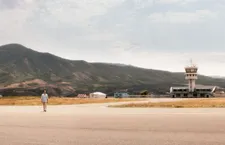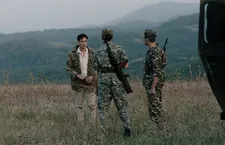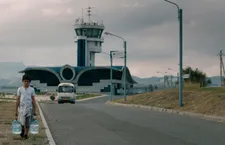 |
| Alain Delage’s (Grégoire Colin) taxi driver (Grigoriy Gasparyan) flaps his wings in Nora Martirosyan’s Should The Wind Drop (Si Le Vent Tombe), Armenia’s Oscar submission Photo: Sister Productions |
Fabulous shots of the landscape (cinematography by Simon Roca), marked by ruins and sheep, by demarcation lines and mist, edited seamlessly by Yorgos Lamprinos (2020 BIFA winner for The Father, directed by Florian Zeller), invite our gaze and engage our curiosity in Nora Martirosyan’s debut feature Should The Wind Drop (Si Le Vent Tombe), Armenia’s Oscar submission, produced by Annabella Nezri (Kaouther Ben Hania’s Oscar-nominated submission from Tunisia, The Man Who Sold His Skin), Julie Paratian, and Ani Vorskanyan).
 |
| Nora Martirosyan with Anne-Katrin Titze: “The Armenians of Karabakh have a very tight sense of humour. When I go there, I laugh from morning till evening.” |
Alain Delage (Claire Denis regular Grégoire Colin), an international auditor is sent to inspect a remote airport of an independent republic in the Caucasus mountains. He is teased and coaxed by the locals as “the Frenchman” who has to be convinced by the airport director Korune Androssian (David Hakobyan) that it is safe to reopen, no matter what.
A determined boy named Edgar [Hayk Bakhryan] distributes magical water, military garb is everywhere. If this sounds as though it were part of a novel by Kafka, be assured, it is not. Martirosyan’s extraordinary film, screenplay co-written with Emmanuelle Pagano (Guillaume André and Olivier Torres are credited as co-writers) is as close to the reality of only a few years back, as it is to fiction.
By following the tale of an attempt to reinstate air traffic at an airport built by the Soviets in 1974, we grasp the story of the entire region, the self-proclaimed independent republic of Nagorno-Karabakh which has been ignored by the world at large. At first oblivious to the tensions between Armenian and Azerbaijani interests, Alain, and with him the audience, try to make sense of the lay of the land. With proof of existence and protection of memory and culture at stake, the goings on are nevertheless as wickedly funny as they are enlightening.
From Montpellier, France, Nora Martirosyan joined me on Zoom for an in-depth conversation on Should The Wind Drop
Anne-Katrin Titze: Hello, hi Nora!
Nora Martirosyan: Hello!
AKT: Should the Wind Drop is equally beautiful and important. Looking at your film, at first I thought, this could have been written by Kafka. Viewers may be lured into the film thinking this is a fictional story, this is a Brigadoon only to realize that this is all very very real. How were you balancing what was going on there then - we’ll talk about the now in a minute - and the fictional, magical quality?
NM: Thank you, it’s indeed a question which is in the centre of the film, in the centre of my reflection of what is the film. Let’s start from the fact, as I’m not coming from cinema, this separation between documentary and fiction, I find it not always completely appropriate. All those films that say based on a true story, as if the fiction doesn’t have the right to exist, as though for ages we weren’t so hungry for fictional stories.
So I thought okay, there is a context which has to be told. Because if cinema doesn’t go there, nobody wants to go there. So through cinema the paradox of this place can be told. And it should be fictional cinema because only the fiction can knit something more poetical, more important, more philosophical than realism. I didn’t want to make a, let’s say, social movie, or telling a true story. I tried to do something which was true to my feelings and to my understanding of this place.
 |
| Nora Martirosyan on Alain Delage (Grégoire Colin): “The airport, you know, symbolizes the desire to fly and the impossibility to do so.” Photo: Sister Productions |
AKT: I think Krzysztof Kieślowski said it best when he said he had to stop making documentaries and started making fiction films because he couldn’t tell the truth otherwise. Also the sense of humour you manage to get in! Alain Delon! It’s so funny, he arrives at the border, I was laughing out loud, thinking where is she going with this? Did the humour come out of the situations, did you point to it, did you find it?
NM: In fact, as all the oppressed populations, all the populations that are very unstable, the Armenians of Karabakh have a very tight sense of humour. When I go there, I laugh from morning till evening. The situation is so comical and if you don’t laugh at yourself you will just get suicidal. So it comes from this population first of all.
My producer [Julie Paratian], when for the first time we made this travel together, she said, I envy you so much that you understand the language because you laugh all the time, you seem to be enjoying the conversations. Also recently I said to my students - one of my first films when I was still a student, and I was watching it and I thought it was really funny - I think it is something which is important for me, that humour is a way to make a distance with a tragedy.
Through the humour you can tell a tragedy without this miserabilist or too heavy approach. The sequences were written, but you know, for ten years I would go back and forth, talk to people and point out the locations which were important to the film. So in fact, I imagined it in France, the dialects, but the dialects were very much motivated by what I heard and the way people act and react.
 |
| Alain Delage (Grégoire Colin) confronted at the border: “He could not go to certain places which are very important to tell the space, to tell the country.” Photo: Sister Productions |
AKT: The mood and the tone are great. Edgar, the water carrier, he is like a mythological figure, at the same time he is very grounded in the place. We find out so many details along the way into the film - that it’s magical water and other secrets which I am not going to give away. How did the idea of the water carrier boy as our guide come about?
NM: The first time I saw the airport I understood that the narration should be written around the airport. Because the airport, you know, symbolizes the desire to fly and the impossibility to do so. Then I realized that my main character, Alain Delage, he could not go to certain places which are very important to tell the space, to tell the country.
And I thought of this boy character who would be our guide, as you said, and the question was: what does he do? Now we come back to the fiction, because believing strongly in fiction, makes the fiction become more real than the facts, let’s say. So as the boy really needs to sell this water and he needs everybody to believe that it’s magical water, so in some sense he is also creating this fiction, as does the director of the airport with his trust that the airport will function.
For all the characters, this is their place for breathing. It’s the place where they can breathe in this very closed and unstable world which is theirs.
Coming up - Nora Martirosyan on traditions and uncanny doubling with the present, a film to tell a country, balancing modernity, protecting memory, not coming from nowhere, the Armenian open wound, nothing sacred, a panda on the onesie, Atom Egoyan’s support, lifting off with an ending and the situation now.
The Oscar International Feature Film shortlist of 15 finalists is scheduled to be announced on December 21. The final five nominees are scheduled to be announced on February 8, 2022. The 94th Academy Awards ceremony originally scheduled for Sunday, February 27 will be held on Sunday, March 27, 2022 at the Dolby Theatre in Hollywood.






















